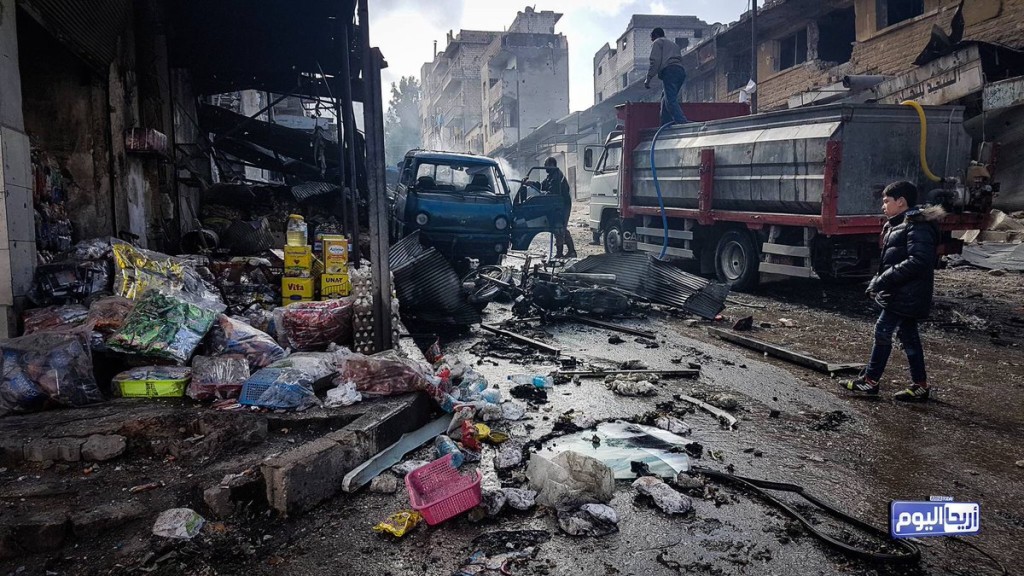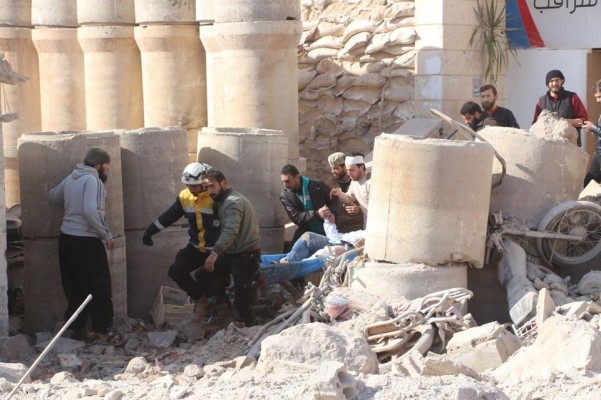More than 30 civilians killed in Idlib Province since Sunday
LATEST
UPDATE 1730 GMT: Russia’s conference for a “national congress” has struggled for legitimacy today amid the absence of Syrian opposition groups, the heckling of Russian Foreign Minister Sergey Lavrov, and squabbling among delegates over who should preside.
The opposition High Negotiations Committee refused to attend, and a smaller group, including rebel officials who had flown in from Turkey, refused to leave the airport in the city of Sochi until Assad regime flags and emblems were removed.
Ahmed Tomah, the head of the delegation, said they would fly back to Turkey: “We were surprised that none of the promises that were given had been kept, the ferocious bombing of civilians had not stopped nor the flags and banners of the regime removed.”
Russian Foreign Minister Sergei Lavrov opened by reading out a statement from President Vladimir Putin saying the conditions were ripe for Syria to turn “a tragic page” in its history, but he was heckled by some delegates who walked out as they noted Russia’s complicity in the Assad regime’s killing of civilians with airstrikes.
Artyom Kozhin, a senior diplomat at the Russian Foreign Ministry, acknowledged, “Some problems have arisen with a group of the armed opposition that has come from Turkey which has made its participation dependent on additional demands.”
UPDATE 1630 GMT: Pro-Assad warplanes struck the main market in the town of Ariha in Idlib Province. At least eight civilians were killed and dozens wounded.

Attacked were also reported on Khan Sheikhoun:
Civil defense teams working to rescue 12 injured civilians, including 5 of them from under the rubble, after warplane airstrikes targeting civilian houses in #Khan_shikhoun city pic.twitter.com/EwgnuFwHVA
— The White Helmets (@SyriaCivilDef) January 30, 2018
The opening of Russia’s long-delayed gathering for a Syrian “national congress” has been overshadowed by pro-Assad bombing killing dozens of people in Idlib Province in northwest Syria.
Residents and rescuers said at least 33 people have killed across Idlib since Sunday by Russian and regime warplanes. More than 20 airstrikes were recorded on Monday on the town of Saraqeb, where an attack on a potato market killed 11 people and injured dozens.
Russian warplanes then reportedly hit the town’s only hospital as medics treated the victims, severely injuring two staff and causing extensive damage, forcing a complete cessation of services. Patients were transferred to hospitals in Idlib city, about 20 km (12.5 miles) northwest of Saraqeb.
Another attack demolished a residential building and killied five members of the same family, a woman and her four daughters.
Most residents of Saraqeb, with about 35,000 residents and 12,000 displaced persons, have fled their homes. Muthana al-Muhammad, president of the local council, said they are now staying “in tents on the city’s outskirts, on the main roads and under the trees”.
On Sunday, the bombing killed 18 people and injured 45 across Idlib. Incendiary attacks on Harasta, in the East Ghouta area near Damascus, wounded at least 18.
See Syria Daily, Jan 29: Pro-Assad Bombing of Idlib and East Ghouta
Sochi Conference Opens Without Syria’s Opposition
Meanwhile, Russia opens its conference in the southern city of Sochi, insisting that the long-delayed gathering would have some political significance despite the absence of Syria’s opposition.
Kremlin spokesman Dmitry Peskov told reporters:
“The fact that some representatives of the processes currently taking place in Syria are not participating is unlikely to stop this congress from going ahead and is unlikely to seriously undermine the importance of the congress.
Everyone recognizes that immediate breakthroughs in the Syrian peace process are unlikely to be possible. The only thing that is possible is patient, incremental, detailed work that can move us forward. In this sense, the congress will be a very important, meaningful step on this road.
Russia’s envoy Alexander Lavrentiev said he some members of other opposition factions — a reference to the “Moscow Group” and “Cairo Group” of politicians and activists supported by the Russians — would attend and that “all strata” of Syrian society would be represented.
Russia’s draft statement for the gathering proclaimed “respect of and full commitment to the sovereignty, independence, territorial integrity, and unity of the Syrian Arab Republic”. Russian State media declared that UN envoy de Mistura, who said last weekend that he would join the proceedings, will head a Constitutional commission to be established by the conference.
Moscow first proposed the congress last autumn but it was held up by a series of political complications, such as Turkey’s objection to the presence of Syrian Kurdish factions such as the Syrian Kurdistan Democratic Union Party (PYD). Last week the opposition High Negotiations Committee, after meeting Russian Foreign Minister Sergey Lavrov in Moscow, said it would not attend.
George Sabra, a leading opposition member, reiterated on Monday, “[Sochi] is a project to serve Russian policy. The Russians are trying, through this congress, to find a place for themselves in the Syrian political space after putting their heavy hand on Syrian land.”
Syrian Kurdish politician Hediye Yusuf also evaluated that little will be achieved at the conference.
France, Britain, and the US also turned down Russian invitations to observe the proceedings, saying that they are an attempt to overtake a UN-supported political process in Geneva.
”All other initiatives, like the Sochi meeting organized by Russia, must support the UN process and be in that framework,” a French Foreign Ministry spokesman said. “We take note of the Syrian opposition’s decision not to go to Sochi. France will not participate in the work being carried out there.”
Britain’s Syria envoy Martin Longden said:
UK will not participate in the Sochi conference. Despite Russia’s efforts the regime refuses to engage and has damaged confidence that Sochi can help the Geneva process.
We urge Russia to use its influence to persuade the regime to cease its destructive behavior.
Sources: Tests Link Assad Chemical Stocks to 2013 Sarin Attacks Near Damascus
Laboratory tests have linked the Assad regime’s chemical weapons stockpile to the August 2013 sarin attacks that killed more than 1,400 people near Damascus, according to diplomats and scientists.
Labs working for the Organisation for the Prohibition of Chemical Weapons compared samples taken by a UN mission in the East Ghouta area after the August 2013 attacks to chemicals handed over by the regime in 2014 for destruction.
The tests found “markers” for sarin in the samples taken at East Ghouta and those at the sites of two other nerve agent attacks: a smaller assault on Khan al-Assal in Aleppo Province in March 2013, and an Assad regime strike on Khan Sheikhoun in Idlib Province on April 4, 2017, which killed at least 92 people according to pro-opposition activists.
The test results were the basis for a report by the OPCW-UN Joint Investigative Mechanism in October which said the Assad regime was responsible for the Khan Sheikhoun attack. UN inspectors have been able to assign blame for the East Ghouta attacks because they had no mandate from the Security Council to do so.
After the October 2017 report on Khan Sheikhoun, Russia vetoed the extension of the Joint Investigative Mechanism’s mission.

